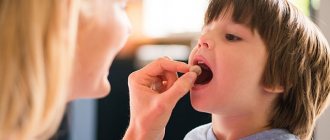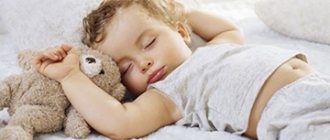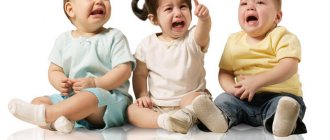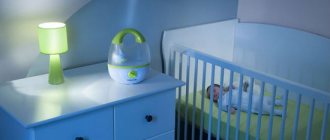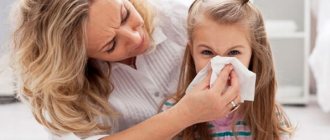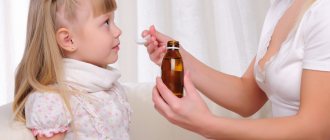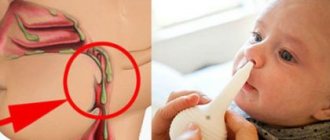Cough: its types and complications
Coughing in children is a protective reaction of the body to external or internal irritants. Depending on the causes and symptoms, the pathology is classified according to several criteria.
| Characteristic | Kinds |
| By strength | Coughing manifests itself rarely and weakly; a hysterical cough has a paroxysmal, intense character. |
| By duration | 1. Acute – accompanies mild viral and bacterial infections, lasts 10-14 days. 2. Protracted – occurs with pneumonia, bronchitis, lasts 2-4 weeks. 3. Chronic - the diagnosis is made if coughing attacks continue for more than 2 months. |
| The nature | Unproductive (dry) cough - barking, hysterical, characterized by severe pain and sore throat, discomfort in the chest, no sputum is produced. Productive (wet) cough - during coughing, sputum is released, along with which pathogenic microorganisms are eliminated. |
| By sound | • silent; • muted; • coughing; • barking, deaf; • chest voiced; • severe paroxysmal. |
Cough is not just an unpleasant sign of the disease, but also a very dangerous symptom. Young children often vomit during an attack, the child becomes frightened and begins to cough even more out of fear.
It is important to know! Depending on the causes, a cough can provoke swelling of the larynx, suffocation, and the development of pathologies of the ears and nasopharynx. With frequent and prolonged attacks of dry cough, bloody discharge may appear due to blood vessels bursting from effort; constant tension is dangerous for many internal organs.
When a child cries a cough starts
A child's cough while crying always causes serious concern for parents. Panic manifests itself in conviction: crying means you are sick. He's sick, that's why he's coughing. In our article we will look at what a cough is and why it appears when a child sobs.
What is a cough
Cough is a reflex release of the bronchi from dust, mucus, and foreign particles. It performs a healing function, rids the bronchi of pathogenic bacteria. This is not always a sign of a cold, viral or chronic disease.
For example, a cough also appears in a healthy child while crying. The reason is that the baby's nasopharynx becomes clogged with mucous secretions.
Excess tears enter the nasopharynx. Congestion from the nose flows down the back of the throat, stimulating the cough reflex. Similar symptoms appear in children aged three to seven years.
Learn about ways to treat coughs due to sinusitis.
Sometimes, while crying, the child begins not only to cough, but also to vomit.
Vomiting occurs during crying for the same reasons as coughing. The nasal ducts are freed from excess fluid, but tears and mucus do not come out through sneezing, but slide down the back wall of the nasopharynx, irritate the soft palate and cause vomiting after coughing.
Carefully! If a child vomits while crying, tilt him face down, otherwise the baby will choke. Wait until the vomiting stops, wash the child with cool water, and give him something to drink. This will stop the sobbing and eliminate stomach cramps.
Reasons and ways to deal with the problem
First of all, find out if there are any signs of an emerging disease: respiratory viral infections, colds. Pay attention to how your baby is feeling at night. The onset of the disease is signaled by a night cough. If it is not present at night, it means that the baby does not have an infectious or cold disease.
Attention! If a cough occurs at night, consult your child’s pediatrician. Quick diagnosis of the disease facilitates further treatment.
First of all, find out the reason for crying and try not to create conditions for the emergence of negative emotions, and also follow the recommendations:
- When crying and vomiting, the water-salt balance is disturbed. Give your child clean water to drink in small quantities. You can add five drops of chamomile or anise infusion to the water. The drink has a calming effect and eliminates the effects of coughing and vomiting.
- Conduct classes with your child on hardening the soft palate .
To do this, apply gentle pressure on it every day with a soft toothbrush or spoon. This training will reduce the sensitivity of the palate, and there will be less gagging when coughing. - Use your child's mouth rinse . This simple procedure to carry out at home will prevent unwanted nasopharyngeal reflexes.
- Daily rinses can be done with weak solutions acidified with lemon juice. Acidic solutions will relieve excessive dry mouth, which also causes coughing while crying.
- The reason for crying followed by coughing and vomiting often lies in the stress that the child experiences when parents quarrel, for example, or from lack of attention.
Excessive attention from parents also leads to undesirable consequences - the whims of the baby. Maintain smooth, friendly relationships in the family. - Harden the baby's nervous system: warm baths at night with sea salt solutions, morning rubdowns with cold water will have a beneficial effect.
- Exercising the muscles of a child's tummy also helps to get rid of gagging when coughing.
If you see that the child is gagging and continues to cry and cough, ask him to clench his left fist. This will stop the vomiting. Then distract the baby’s attention, offer to play or take a walk.
Find out how to get rid of purulent sputum when you cough.
Conclusion
Baby crying that causes coughing and vomiting has various causes. Parents will need attention and patience to identify and eliminate the cause. This could be overwork, fear, discomfort, nervous breakdown. If it is detected, be sure to consult a doctor; self-medication in this case is excluded.
At the same time, we should not forget that crying is a natural expression of emotions. But emotions cannot be prohibited. The more tender and emotional your baby is, the faster he can cry, but the easier it is to distract him from sad thoughts, offer him a game, and make him laugh. If there are obvious signs of the disease, the help of a medical practitioner will be required.
source
Reasons for the development of night cough in children during sleep
Night coughs in children can be triggered by pathogens, allergens, worms, and sometimes the parents themselves are to blame for the attacks.
The main causes of cough in a child's sleep:
- viral, bacterial, fungal infections, parasites;
- allergy;
- whooping cough can also occur after vaccination against this disease;
- gastro-food reflux;
- foreign body inhalation;
- heart pathologies;
- passive smoking, negative environmental factors;
- dry, dirty, very hot or cold air in the room;
- nervous overstrain against the background of parental litter, resentment, stress.
In asthma at the initial stage of development of the disease, coughing attacks occur only at night or immediately after waking up, while a characteristic whistling sound is heard when inhaling. The appearance of unpleasant symptoms during sleep is caused by complete relaxation of the lungs; in this state, they are more susceptible to external and internal stimuli.
Children with cerebral palsy have a weakened immune system, suffer from physical inactivity, problems with the digestive system, all this often provokes the development of a special type of pneumonia in them, which is accompanied by attacks of night cough.
It is important to know! From a psychosomatic point of view, cough occurs in children in authoritarian families, in children who suffer from a lack of parental attention and love.
Respiratory diseases
If a child starts coughing in his sleep, the cause is most often flu or colds. The immune system in children is imperfect and therefore susceptible to attacks by viruses and bacteria.
Coughing at night occurs due to nasal congestion - the child breathes through the mouth, snot flows into the larynx, irritates the mucous membrane, which causes a slight cough or a severe coughing attack.
Allergy
Allergic cough most often has a seasonal nature, occurring during the flowering time of certain plants, but hay fever is characterized by daytime attacks.
If the child coughs only at night, the allergen is definitely in the room. This includes furniture, bedding, pajamas, toys, pillows; an attack can also be caused by washing powder used to wash children's clothes, or a new bathing product.
How to help your child during a night attack
It can be very difficult to calm a child's dry cough at night. But you can alleviate the baby’s condition if you know how to act correctly in such a situation.
Here's how to help your child cough at night:
- Drink plenty of water during illness. This will increase the production of sputum and make it more liquid, which will facilitate its removal.
- Reduce the air temperature in the room.
- Increase air humidity.
- Give your child an antihistamine to help calm a child's allergy cough at night.
- Change your baby's position more often during sleep to prevent mucus from accumulating in the lungs.
- Reduce the number of allergens in the room, do not use essential oils and rubbing.
If a child’s severe cough at night lasts for several days in a row, be sure to consult a pediatrician to prevent serious complications.
source
Therapeutic measures
Attacks of sudden severe coughing at night frighten the child and his parents and can pose a threat to health and life, so every effort must be made to quickly cope with unpleasant symptoms.
Parents' actions during an attack
The procedure to take during an attack depends on the type of cough and the reasons that could have caused it.
What to do for a dry cough:
- Ventilate the room, humidify the air, go out onto the balcony or outside.
- Give the child warm water, tea, milk and honey, and calm him down.
- Rinse your nose with saline solution.
- Turn on hot water in the bath, let the child breathe warm, moist air.
- If the child has calmed down a little, inhale with a nebulizer with saline solution.
In case of a wet cough, it is necessary to speed up the process of sputum discharge - massage the back, remove mucus from the nose, give warm milk with alkaline mineral water, ask the child to walk on his hands.
If you have an allergic cough, remove possible allergens, give an antihistamine tablet, and urgently call an ambulance, since there is a high probability of developing anaphylactic shock.
What not to do
During an attack, parents should not panic and give their child expectorants, antitussives, and antibiotics at the same time. Inhalations and rubbing with alcohol-based solutions are contraindicated for children under one year of age. At high temperatures, any warming procedures cannot be performed.
Attention! It is necessary to immediately call an ambulance if a child has a barking cough, if the attacks occur against a background of high temperature, are accompanied by whistling in the chest, difficulty breathing, and there is blood in the sputum.
First aid and treatment
Creating a microclimate, care and routine are simple postulates for relieving a cough in the morning or evening. You can stop attacks by maintaining a healthy atmosphere in your home. To do this, protect your child from external exposure to smoke, stale air, tobacco smoke, which can cause irritation of the mucous membrane of the larynx and bronchi.
A child may choke on leftover food in his sleep if he ate before bed, and cough violently - all these are completely natural reasons. But they are not accompanied by sputum production, so that during sleep the child begins to cough strainedly or loudly, wheeze or scratch his throat.
The time until treatment is too difficult should not be missed, and you must definitely give the child an expectorant or medications to relieve inflammation. The next morning, visit a doctor to establish an accurate diagnosis and prescribe appropriate treatment.
The table contains information about possible treatment methods for a cough in a child with sputum production:
| Type of therapeutic agent | Components | Effect of use | Contraindications |
| Drug treatment of cough is carried out as prescribed by a doctor. The therapeutic course depends on the nature of the pathology that provokes nighttime secretion of sputum and causes irritation of the respiratory system and stimulation of the cough center. Options for drug treatment of cough are selected depending on the type of underlying disease. | Medicines recommended by the doctor: • to thin sputum; • to suppress the effect on the cough center; • calming reflex irritation of the diaphragm; • antihistamines (for allergies); • antiviral or antibacterial; • immunomodulators. Pulmicort is prescribed for bronchial asthma | Elimination of hypertrophied reaction to irritation of the vagus and pharyngeal nerves. Stabilization of the nervous system and disease state. Elimination of an allergic reaction. Fight against parasitic or bacterial infection, virus. Strengthening natural immunity. | Any side effects depending on the type of drug and its suitability for purpose. |
| Decoctions | Medicinal herbs | For a wet cough at night in a child | Reaction of individual immunity. Allergy. Side effects from incorrect use. |
| Inhalations | • hot jacket potatoes; • aroma oils; • medicinal decoctions. | Warming up the mucous membrane, destroying pathogenic microflora. | Respiratory irritation. Possible burn of the mucous membrane. |
| Grandmother's recipes: • rubbing the chest; • warming. | • Heated lard, badger, goose or bear fat. • Mustard plasters on the chest or dry mustard in socks. • Burnt sugar added to a warm drink. Better milk. • Rubbing with black radish juice. | Warming and soothing. Irritating and warming, helping to calm down the inflammatory process. | Allergic reaction to animal and fatty components of the composition. Skin irritation and burns from mustard or mustard powder. Heartburn. |
| Compresses and applications | • Baby cream or vegetable oil for pre-lubrication. • Insulating and insulating layer. • Cabbage leaf, cottage cheese, mustard with honey. | Liquefaction of viscous sputum. Increased cough productivity. Elimination of the irritating factor. | Inconvenience of use. Negative reactions of the child. Additional sputum production when crying. |
| Quick remedies to relieve an attack of night cough with phlegm. | • Camphor alcohol for rubbing. • Heated fat orally, in a warm drink or alone. • Hot milk with soda and honey. | Soothing and warming. Envelops the mucous membrane and stabilizes breathing. Normalizing the condition of the mucous membrane. | Allergic reactions. The attack develops even more if the cause of the cough and the method used do not coincide. |
Cough medicines
A child's severe cough during sleep requires immediate treatment. Children do not yet know how to cough, the infection begins to go down, which is fraught with the development of pneumonia and other serious diseases of the respiratory system.
How to treat a cough
| Type of cough | Effective drugs |
| Dry | "Sinekod", "Gedelix", "Bronholitin". |
| Wet | "ACC", "Ambrobene", "Mukaltin". |
| Allergic | "Suprastin", "Tavegil", "Zodak". |
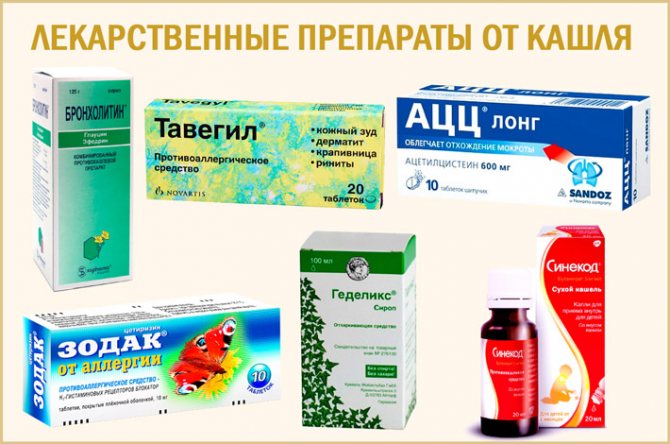
Additionally, the doctor prescribes medications that help eliminate the immediate cause of the cough - antibiotics, antiviral, antiparasitic agents, medications to reduce the acidity of gastric juice, vitamin complexes.
Folk recipes
Bee products and medicinal herbs effectively help with coughs, but they can cause severe allergic reactions, so they must be used carefully.
Simple recipes:
- Add 1 tsp to 200 ml of warm milk. honey, 5 g butter, soda on the tip of a knife.
- Make a small hole in the black radish and pour honey into it. After 2 hours the juice will appear, it should be given to the child 1-2 tsp. every 2-3 hours.
- Mash 2 bananas, pour 250 ml of boiling water, simmer over low heat until boiling, cool. Give the child 1–2 tsp. You need to eat the entire portion of the medicine per day.
It is important to know! Using unconventional methods alone, it will not be possible to cope with a child’s cough; folk remedies can enhance the effect of medications, but it is impossible to completely replace antibiotics and antihistamines with herbs, milk and honey.


